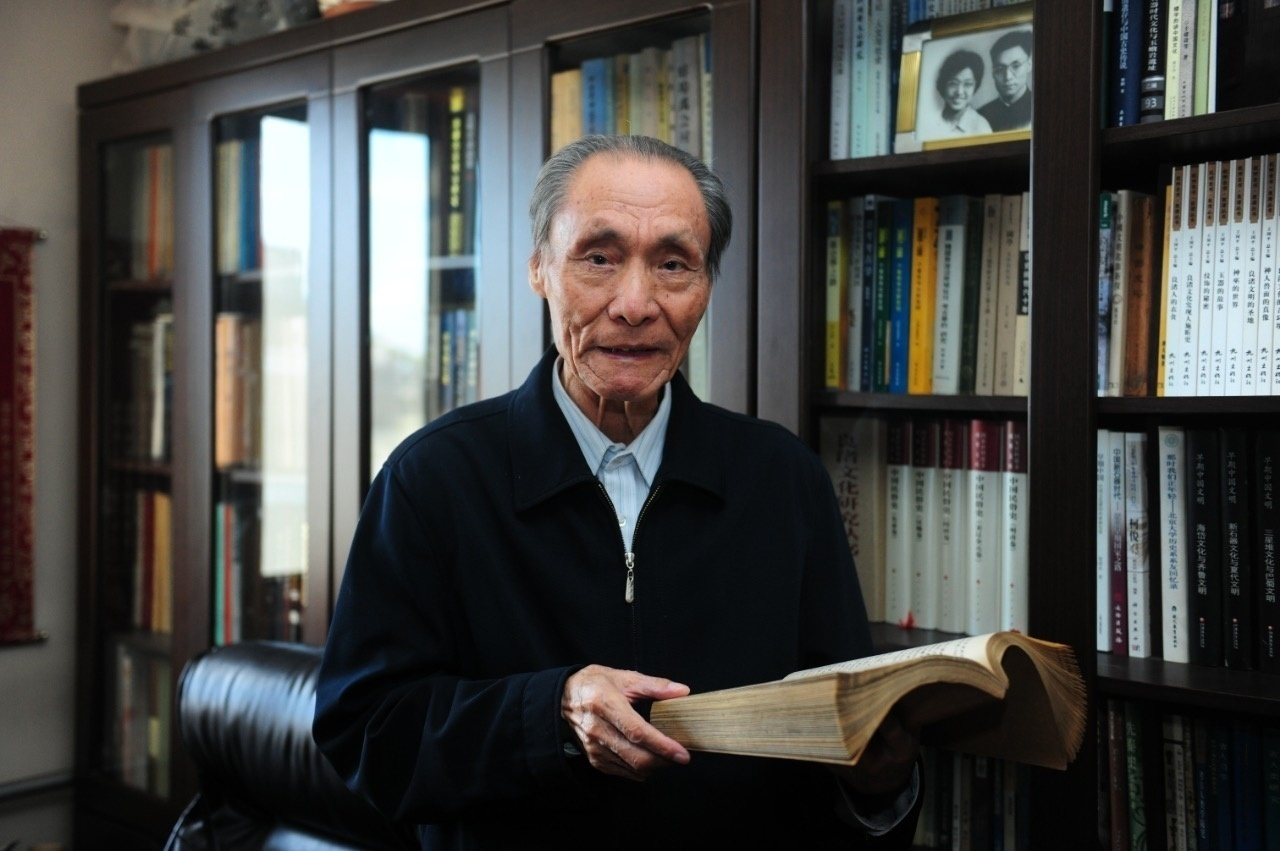Prof. Yan Wenming awarded first-ever lifetime honor at Shanghai Archaeology Forum
Dec 18, 2023
Yan Wenming
Chinese archaeologist Yan Wenming, a distinguished professor at Peking University, was honored with the Lifetime Achievement Award during the fifth Shanghai Archaeology Forum (SAF), which marks the first time a Chinese scholar has received such recognition.
This award is to honor "his exemplary record of scholarly contributions that have significantly advanced the field of archaeology and his dedication to educating the public about the importance and relevance of archaeology in modern society and our shared future," the award citation stated. Previous winners of the award include US archaeologist Jane Buikstra and British archaeologist Colin Renfrew.
Yan expressed his gratitude and humbly noted in a handwritten acceptance speech, "Thank you for this lofty honor. I am just diligent in my work and not concerned about the harvest."
"Yan is a globally renowned figure in Neolithic archaeology, with significant contributions in areas such as the origins of agriculture, settlement archaeology, the origins of Chinese civilization, the Neolithization process in China, and archaeological theory and methods," Shen Ruiwen, dean of the School of Archaeology and Museology at Peking University, told the Global Times on Sunday.
"The ancient civilization of China is a crucial component of world civilizations. Yan's recent award signifies that Chinese archaeology and its achievements are increasingly gaining attention and recognition from international peers," Shen noted.
Born in 1932 in Central China's Hunan Province, Yan majored in archaeology at the Department of History at Peking University. After graduating in 1958, he later joined the faculty of the University.
Throughout his career, he held significant positions such as the head of the Archaeology Department at Peking University and vice chairman of the Chinese Archaeological Society. Currently, he is a senior professor at the University.
According to Shen, during Yan's term as head of the School of Archaeology and Museology, he actively promoted the internationalization of Chinese archaeology and contributed significantly to China's Neolithic archaeology, emerging as a representative figure in this field.
Yan's academic journey began with his outstanding research on the Yangshao culture. One of the world's earliest Neolithic cultures, it was mainly distributed along the middle and lower reaches of the Yellow River. His extensive investigations into the Neolithic period across the country laid the foundation for the chronological and genealogical framework for research into Chinese Neolithic culture.
Yan also advocated for interdisciplinary research, integrating archaeology with natural sciences. His book Research on the Yangshao was awarded the First Prize for Outstanding Achievements in Humanities and Social Sciences, among other awards.
The forum also celebrated nine SAF Field Discovery Awards, including the remarkable discoveries at the Sanxingdui site in Guanghan, Southwest China's Sichuan Province. The site, which dates back 3,000 years, witnessed a new round of excavations starting in 2019. Notable among the findings are six sacrificial pits containing over 17,000 cultural relics, including gold ware, bronze vessels, pottery, and jade artifacts.
Ran Honglin, a research fellow at the Sichuan Provincial Institute of Cultural Relics and Archaeology, who is in charge of the Sanxingdui Ruins site, talked to the Global Times on Sunday about his team's success.
According to Ran, the significant discoveries at the Sanxingdui site, including the confirmation of ancient sacrificial areas belonging to the ancient Shu Kingdom and the unearthing of over 17,000 precious artifacts from six sacrificial pits, are unprecedented archaeological findings.
In addition, the innovative archaeological work at the Sanxingdui Ruins site, including the conceptual approach, methodologies, interdisciplinary research, and technical means, demonstrates the innovative nature of modern Chinese archaeology.
Meanwhile, the discovered artifacts and the cultural features they present showcase the diverse and integrated nature of Chinese civilization, emphasizing its enduring history and providing a narrative of China's story to the world, Ran said.
Other key award-wining projects included the early monumental constructions at the Aguada Fenix site in Mexico, the newly unearthed early-stage Harappan cemetery in Gujarat, India, dating from 3200 to 2600 BC, the first European agrarian cities from 4100 to 3600 BC in Ukraine, early cave art in Sulawesi, Indonesia, and rock art painted in Colombia.
Another 10 archaeological studies won the SAF Research Awards. They excelled in long-term studies of world-famous sites like the Apidima Cave in Greece, which provides early evidence of Homo sapiens in Eurasian, and Angkor in Cambodia.
The forum was first held in 2013. Lasting from Friday to Sunday, thisyear's theme is "Archaeology of Climate Change and Social Sustainability," which highlights the critical role of environmental factors in shaping human activities throughout history. It was held from Friday to Sunday.
Shen pointed out the importance of the forum's theme that human activities are influenced by the environment and climate, particularly in the early stages of human history. Archaeology integrates techniques from various disciplines to conduct environmental archaeological studies, exploring and revealing the interactions between archaeological cultures, their phases of change, and the environment and climate. This has become a crucial sub-discipline in contemporary Chinese archaeology, providing potential insights for today's societal development.
Ran listed the Sanxingdui Ruin site as an example of the environmental differences between the time of the site and the present, evidenced by the presence of elephants in the Chengdu Plain during that period, which had a tropical rainforest climate, offering valuable insights into climate change and its crucial role in human survival, production, and the rise and fall of civilizations.
